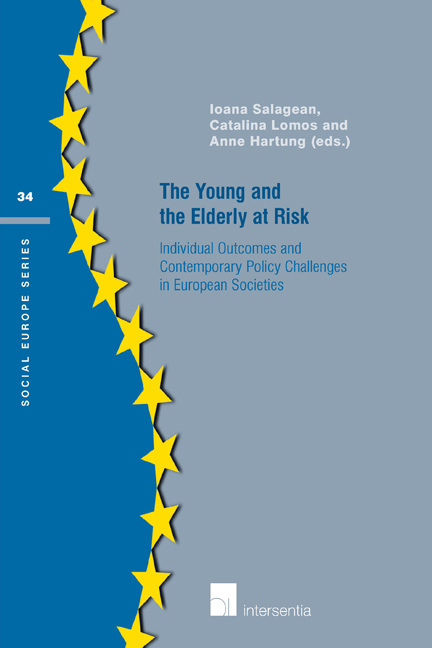 The Young and the Elderly at Risk
The Young and the Elderly at Risk Published online by Cambridge University Press: 13 December 2017
ABSTRACT
In present economic turmoil, the acute economic needs of a young and vulnerable section of the population needs to be balanced with increasing costs of old-age welfare provisions. The consequence of this political exercise regards the question whether the intergenerational social contract is under pressure. Particularly in public policy, the concern has grown that younger age cohorts are less likely to contribute to elderly welfare provisions, whereas similar concerns arise that the older cohorts are more negative towards welfare provisions that benefit young and active sections of the populations. Although previous studies contradict such ‘age war’ in welfare opinions, less is known which mechanisms drive such gaps between the young and the old, as well as why these cleavages are larger in some societies than in others. An analysis of the ‘Welfare Attitudes’ module of the 2008 European Social Survey confirms that small yet meaningful age gaps in opinions about elderly welfare provisions and childcare services exist. Yet, these gaps can largely be explained by the opinions of younger respondents who are less inclined to support welfare redistribution at large. While the age gap in elderly welfare spending is less context dependent, the elderly are more opposed to childcare provisions in wealthy societies.
Keywords: Solidarity, social contract, generations, civil rights, public opinion
INTRODUCTION
Whether intergenerational solidarity from the young to the old is under pressure worries many European governments. This concern is mainly inspired by increasing welfare expenses due to population ageing, which are carried disproportionately by a decreasing active share of the population. Such inequity could eventually lead to a break of the social contract that spans generations (Bengtson & Achenbaum, 1993; Esping-Andersen & Sarasa, 2002). This worry is further exacerbated by the belief that modernisation has eroded general feelings of solidarity, especially between age groups (Popenoe, 1988). Present economic turmoil sharpens age specific welfare demands even more, as in many European countries faced with deficits the share of young people in economic insecurity is on the rise, sparking the attention of many to the challenge of balancing the interests and needs of diff erent generations.
To evaluate tensions in the intergenerational social contract, there is a strand of studies that address the issue on the basis of public opinion surveys that ask about people's attitudes towards welfare provision for the elderly (Busemeyer et al., 2008; Kohli, 2006).
To save this book to your Kindle, first ensure [email protected] is added to your Approved Personal Document E-mail List under your Personal Document Settings on the Manage Your Content and Devices page of your Amazon account. Then enter the ‘name’ part of your Kindle email address below. Find out more about saving to your Kindle.
Note you can select to save to either the @free.kindle.com or @kindle.com variations. ‘@free.kindle.com’ emails are free but can only be saved to your device when it is connected to wi-fi. ‘@kindle.com’ emails can be delivered even when you are not connected to wi-fi, but note that service fees apply.
Find out more about the Kindle Personal Document Service.
To save content items to your account, please confirm that you agree to abide by our usage policies. If this is the first time you use this feature, you will be asked to authorise Cambridge Core to connect with your account. Find out more about saving content to Dropbox.
To save content items to your account, please confirm that you agree to abide by our usage policies. If this is the first time you use this feature, you will be asked to authorise Cambridge Core to connect with your account. Find out more about saving content to Google Drive.